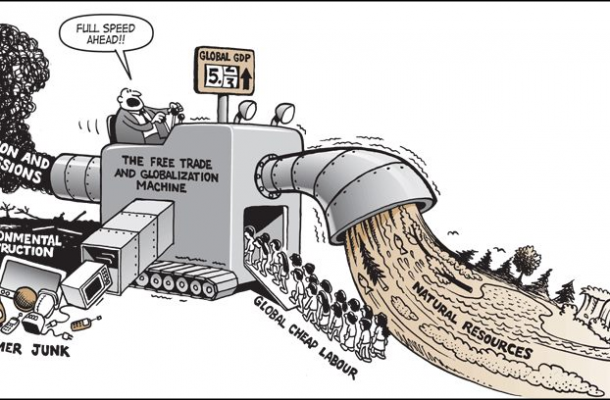Business and social change

I will present a dilemma and an innovative solution.
Looking at the big picture, we live a globalised civilisation that is ecologically self-destructing. This includes businesses, of course.
And it’s not just global warming, but also diminishing freshwater supplies, declining fish stocks, urban sprawl destroying prime farmland… and more.
The title cartoon sums up the situation – If current trends continue, environmental conditions will change so much that business itself will become impossible. The recent Australian bushfires gave us a taste.
How might business people respond? Currently some businesses focus on making their business and supply chains environmentally sustainable.
Other businesses create environmentally responsible products, such as solar panels.
This is all to the good. But should corporate social responsibility stop at the company gates? I think not. Our challenge is to change the way our whole society operates. It is of no avail to be locally sustainable when whole system is driving our destruction.
So, the good work of these businesses is only a partial response to a much greater problem.
To highlight it, let’s consider the question:
What are the major factors that tend to make environmental trends, including global warming, worse?
Anything that increases industrial production tends to increase environmental damage. To be realistic, this calls our whole economic system into question, because economic growth requires continuous industrial expansion.
I recognise that challenging ‘economic growth’ may raise an emotional red flag for some people. And for good reason. People are concerned about jobs and livelihoods, and the way our economy currently operates requires continuous growth.
We are caught in a bind between economic growth on the one hand, and the need to preserve our life-support systems on the other.
I call this Tainter’s Dilemma; we are not the first society to encounter it.
Ancient Sumer was the first civilisation to develop irrigation. Irrigation led to greater crop yields, which in turn supported not only increased population, but surveyors, engineers, accountants, the king and his court, and the military. Good – for a time. But it turned out that irrigation induced salination. As saltwater came to the surface, crop yields decreased.
Anthropologist Joseph Tainter points out the dilemma the governing elites faced. If they reduced irrigation, their population would revolt because of food shortages. But increasing irrigation would increase salination.
In the event, they did what elites typically do in this situation: they pushed harder at what they were already doing. In Sumer’s case they shifted from two crops a year to three, attempting to increase grain production. I expect you know what happened.
We have an option that was not available to the Sumerians. As Amory Lovins showed in Natural Capitalism, we have the design skills to massively reduce the resources we mine and consume. We could live within planetary boundaries provided… that collectively we choose to slow the economy and live materially modest lifestyles.
A big ask!
Working out how to achieve this can probably only be done through a new order of collaboration between business, government, and civil society. The challenges far transcend politics. Going forward, a government of the day would do well to convene extended think tanks for working out how to transition to a very different kind of economy and way of living.
Mobilising thoughtful public will
A politician once commented, “We politicians cannot get too far ahead of the people.” If we are to even consider making massive changes, prior public will for such changes is absolutely essential.
How might we catalyse it? In what follows I show a line of thinking that makes it possible.
As the cartoon above indicated, we are faced with a ‘wicked problem’ with many factors. We can deal with a wicked problem by setting a positive goal and improvising our way towards it. One way to phrase such a goal is:
The task of our time is to transition to a life-affirming culture, rather than continuing on our present course of ecological self-destruction.
Well, setting set a goal is fine. But how might we seed it into mainstream thinking? How might we enable ordinary people and influential decision-makers to come to grips with the fact that continuing with economic growth will destroy us, and we need to change the whole system profoundly in ways that take care of people and the planet? And that it is possible to do so?
The good news is that there are many environmentally responsible businesses. And there are millions of groups that care about environmental and social well-being. The combined networks of the people in these businesses and groups are massive; we reach into every level of society.
So we have a vast under-utilised resource: ourselves. We can reach the mainstream by talking with our friends, neighbours and business colleagues about the reality of our existential emergency, and about the systemic changes necessary to have a hope of things coming right. In other words, we act as citizen-educators.
Yes, I recognise that this would break from normal social conventions, but we are in an existential emergency.
In parallel, public thought leaders can articulate the overarching goal of a life affirming culture, and what it will take to get there. And businesses (Marketing 101) could also do simple things such as putting up plaques that say,
This business supports the transition to a life-affirming culture.
We have a society that is not ecologically sustainable.
You can help turn things around.
We want the goal of transitioning to a life affirming culture to be seen everywhere.
Andrew Gaines is the instigator of Inspiring Transition, a citizen-led educational movement to inspire thoughtful mainstream commitment to doing everything required to transition to a life-affirming global culture.












